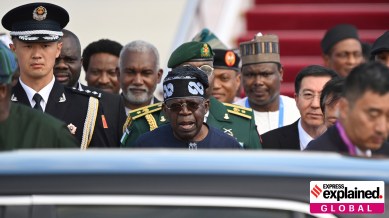Why Donald Trump targeted Nigeria, and what lies beneath
Trump publicly berating Nigeria over 'Christian massacres' highlights crucial questions over sovereignty, diplomacy, and the place of religion in global politics. How Nigeria handles the issue could have significant consequences. An expert explains.

When Donald Trump claimed recently that the Nigerian government was failing to protect Christians from “massacres” by Islamist extremists, warning that Washington would “cut off all aid” to the country and even “hit hard and fast”, he raised quite a few eyebrows.
Nigeria rejected this narrative, stating the violence is not a campaign of religious persecution but a complex web of terrorism, banditry, land disputes, and ethnic rivalries that impact both Muslims and Christians.
The episode highlights crucial questions over sovereignty, diplomacy, and the place of religion in global politics. Were the dispute to widen, it could create problems for Nigeria.
What was the latest episode with Trump
Trump’s criticism draws on reports, often amplified by US evangelical groups, of attacks on Christian communities in central and northern Nigeria, particularly in Plateau, Benue, and Kaduna states. These regions have seen recurrent massacres blamed on Boko Haram, the Islamic State West Africa Province (ISWAP), and armed Fulani militias. To Trump’s core voter base, these attacks fit a narrative of Christians under siege in Muslim-majority regions.
Nigerian officials and international observers offer a nuanced view: extremist groups target both Christians and Muslims. Many attacks stem from disputes over land, grazing routes, and local authority rather than religion alone.
Indeed, the Middle Belt, where much of the violence occurs, is a mosaic of ethnic and religious communities competing for dwindling land amid desertification and rapid population growth.
Nigeria’s response to Trump’s claims was measured but firm. Foreign Minister Yusuf Tuggar said, “It’s impossible for there to be religious persecution supported in any way by the Government,”, reaffirming that the constitution guarantees religious freedom and equality.A presidential adviser said Nigeria welcomed US counterterrorism assistance “as long as it recognises our territorial integrity.”
Some Nigerian commentators criticised the government’s handling, describing its initial communication as fragmented and reactive. Others bristled at Trump’s language, particularly his reference to Nigeria as a “disgraced country”
Legal scholar Akin Oyebode went further, calling Trump’s threats “misadvised, misdirected, and imperialistic.” By framing a multidimensional conflict solely in religious terms, he argued, Washington risked undermining Nigeria’s sovereignty and misreading the nature of its security challenges.
What is happening in Nigeria?
The core issue is the broader insecurity in north and central Nigeria. Three overlapping conflicts converge there: terrorist insurgencies led by Boko Haram and ISWAP targeting civilians and security forces alike; communal clashes between herders (mainly Fulani) and farmers over land and water; and criminal banditry, including mass kidnappings and extortion.
These drivers intertwine with poverty, weak governance, and environmental stress. Climate change has shrunk arable land, pushing herders southward and intensifying disputes. Arms proliferation and unemployment provide fertile ground for recruitment into militant groups.
Trump’s portrayal of a “Christian genocide,” while resonant in some circles, oversimplifies this reality. Most analysts, including at the UN and regional think tanks, emphasise that victims and perpetrators cut across religious lines. The violence is less a holy war than a breakdown of state authority in neglected regions.
Nigeria’s turmoil also mirrors broader instability across the Sahel region of Africa, from Mali and Burkina Faso to Niger and Chad. There too, Islamist insurgencies exploit weak governance, ethnic grievances, and climate stress.
Yet Nigeria differs in crucial ways. While jihadist groups in the Sahel control vast swathes of territory and have helped topple governments in coups, Nigeria’s state institutions remain intact and democratic governance endures. The violence is severe but contained, not existential. Nigeria’s challenge is to prevent what analysts call “Sahelisation”,a slide toward chronic insecurity and fragility.
Potential consequences if US-Nigeria rift widens
The Trump controversy could strain Nigeria-US relations at a sensitive time. The US is already at loggerheads with South Africa, the other large African country.
The US remains Nigeria’s largest bilateral donor, providing over $1 billion in annual assistance till 2024 through USAID and PEPFAR programs. Counterterrorism intelligence, surveillance technology, and A-29 Super Tucano aircraft have also been provided.
Beyond security, the US is a significant trade and investment partner. Nigeria benefitted — albeit unevenly — from the African Growth and Opportunity Act (AGOA), which provided duty-free access for exports. Though most of Nigeria’s AGOA trade has been oil-based, recent efforts aim to diversify into textiles, agriculture, and manufacturing.
Any aid freeze or diplomatic downgrade could have ripple effects across sectors.
However, Nigeria is no longer as dependent on Washington as it once was. It maintains growing ties with China, India, and the European Union, diversifying its strategic options and limiting US leverage.
How Nigeria should respond moving ahead
For Abuja, the most effective response is clarity. Nigerian officials can defuse the crisis through data transparency, independent verification, and sustained engagement with multiple US institutions beyond Trump’s inner circle.
Sharing verified casualty data and allowing international observers into affected regions would undercut exaggerated claims. Nigeria can highlight interfaith peacebuilding initiatives, joint Christian-Muslim dialogues, local reconciliation efforts, and deradicalisation programs, to demonstrate commitment to religious harmony.
Diplomatically, a calm and factual tone is key. Avoiding emotional rebuttals while reaffirming national sovereignty reassures international partners and preserves Nigeria’s image as a democratic and responsible actor in Africa.
Trump’s attack may be politically motivated, aimed at energising his evangelical base during a volatile campaign season. Yet it touches on a real issue: Nigeria’s struggle to contain escalating violence that has taken many lives. If handled wisely, this episode could push Nigeria to communicate its challenges more effectively, strengthen governance in conflict zones, and deepen genuine international partnerships. If mishandled, it could harden stereotypes, erode trust, and invite unwelcome interference.
Gurjit Singh is India’s Former Ambassador to the African Union and the author of The Harambee Factor